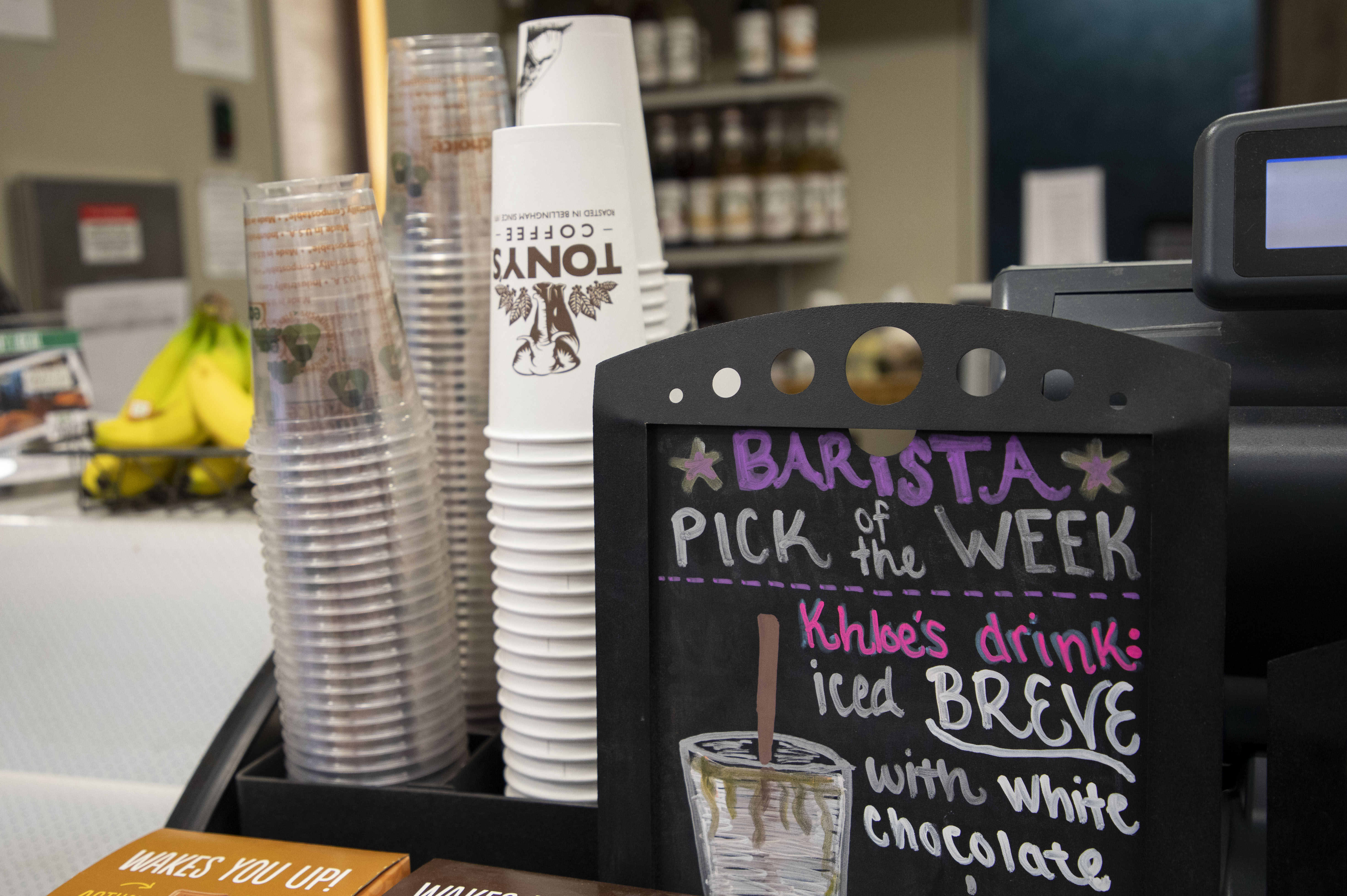Coffee cups stacked up at the Miller Market on Thursday, April 18, 2019. Ella Banken//AS Review
Correction on 4/22: the proposed initiative is not currently working with Zero Waste Western. The AS Board’s vote was added.
Correction on 4/19 to reflect new information on AS Board agenda item on the proposal. The article will be updated once there’s more information.
By Jack Taylor
The price of coffee could soon be changing on campus.
In a new proposed initiative, presented by students Zach Griffin and Victoria Smith at the April 9 Associated Students Board of Directors meeting, Griffin and Smith proposed potential changes in beverage prices for five on-campus locations excluding Starbucks in Arntzen Hall.
Griffin explained how the initiative would work by creating two different prices.
“The initiative would change the menus of on-campus facilities that sell coffee related beverages by separating the price of the beverages from the price of disposable materials,” Griffin said. “Buyers that bring reusable cups will pay only the lower beverage price, and buyers that do not bring reusable cups will pay the price of both the beverage and the disposable materials.”
The example provided at the meeting was all drinks would be lowered by $0.25, so a latte would be about $3.00.
However, despite enthusiasm from board members, Griffin and Smith’s adviser Seth Vidaña recommended withdrawing their proposal so not to overstep Western’s dining services.
Levi Eckman, AS VP for academic affairs, cautioned against such action and questioned if going straight to dining services would be more productive without having data on if students support the changes.
“As someone who works very closely with university administration, I worry that this might be a ploy on behalf of university officials,” Eckman said.
Fearing that the administration may try to halt the initiative so to prolong the changes, Eckman believed that gathering the votes of students would only empower the initiative.
Griffin and Smith both vouched for Vidaña’s integrity, but still expressed desire for getting the initiative on the ballot.
“I wanted to get it on the ballot because it affects students,” Griffin said.
Regardless of how students vote, the initiative would have to be approved by dining services.
Natasha Hessami, AS VP for governmental affairs, agreed with Eckman that the administration wouldn’t like to see this initiative pass.
“I agree with everybody. The administration does this a lot in that they act like they care about you but in reality they don’t,” Hessami said. “In my personal opinion, if you put this on the ballot right now and show that you have a lot student support, it will have a lot more weight for when you go to dining.”
Having been influenced from the paper bag tax, Griffin stated that the lowering the price will not decrease sales for those on-campus locations. By providing an incentive for students to use reusable cups, sellers will see a drop in production costs as the use of disposable cups falls. This is all hypothetical, but Griffin said students will see the difference and make changes in their lifestyle.
“If you don’t have a reusable cup, people will notice that they will have to pay [the tax]. People will notice that they have a choice to waste,” Griffin said.
Griffin also called into question the idea of shadow prices.
“We need to address more than what the financial cost is. There is more to the cost of something than the dollars and cents,” he said. “So per cup, you have to think about the cost on the community.”
Compostable cups also came under fire. Called a band-aid solution by Griffin, he said that the habit of wasting needs to change entirely.
On April 19, the AS Board voted to make the proposed initiative into a referendum item for the AS Spring Election ballot.
More information on the initiative can be found on the Anti-Made for Waste Coffee Cup Initiative document on the AS board’s website.

